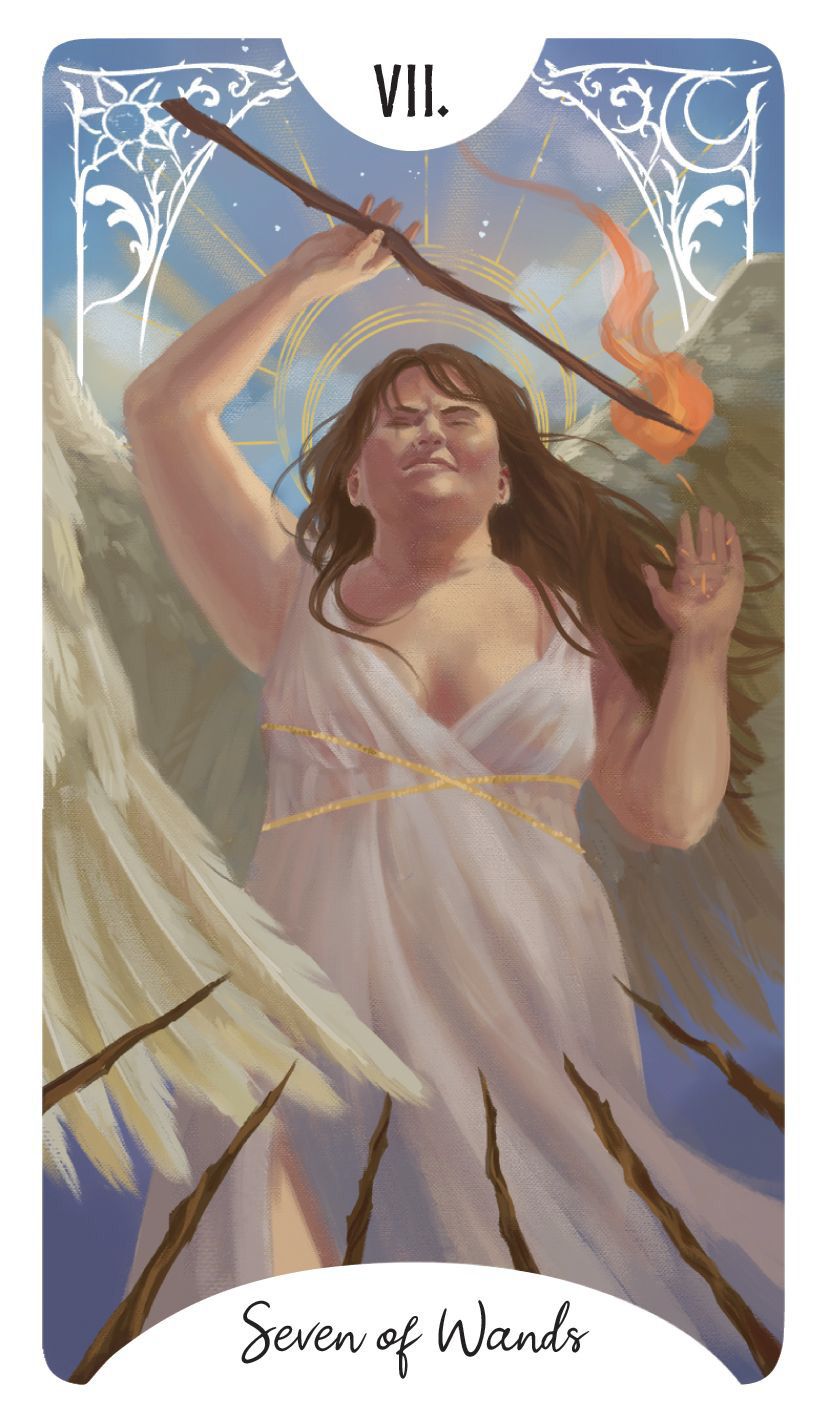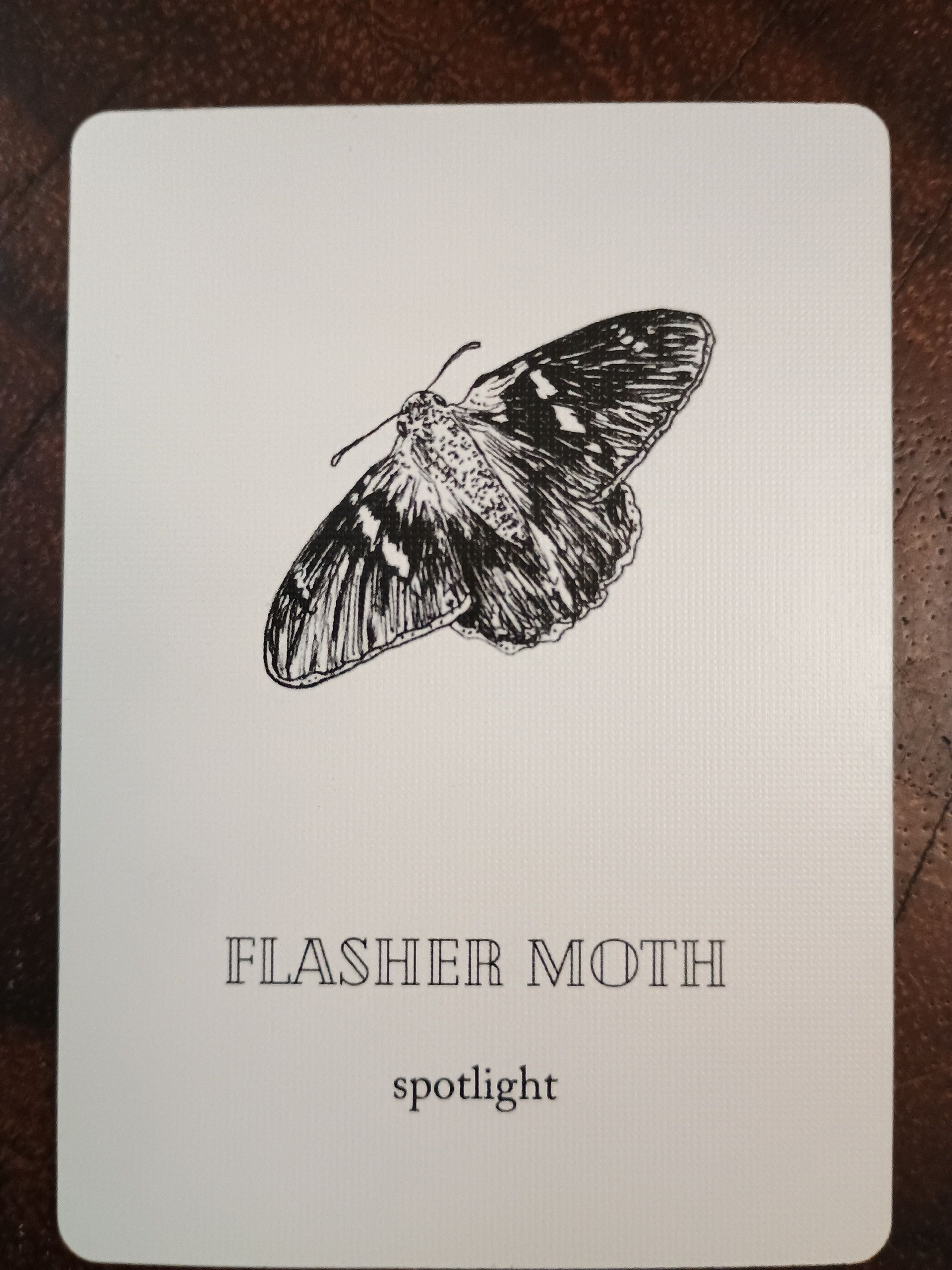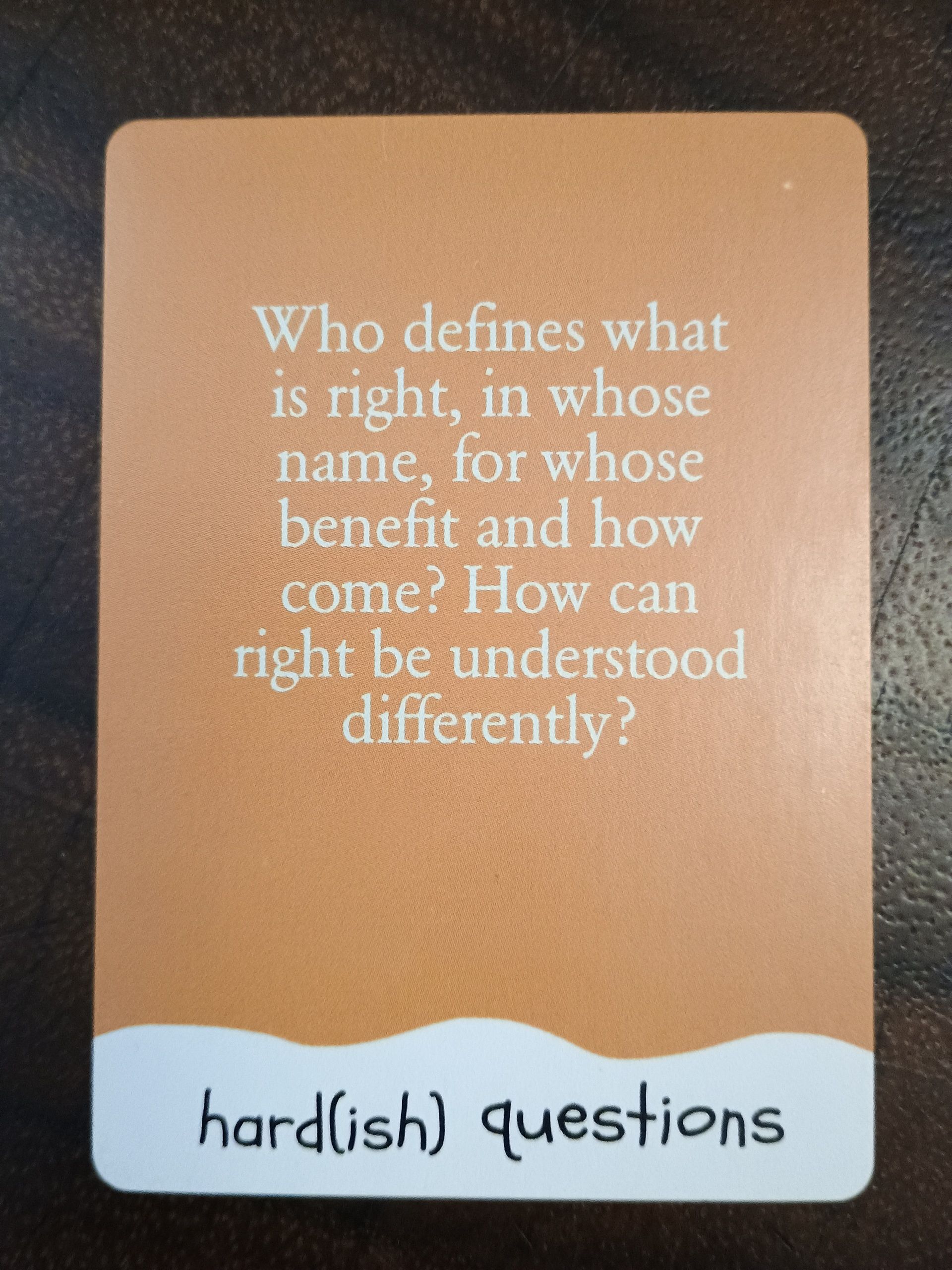
Beloveds,
There's a difference between having values and being willing to defend them. Between knowing what matters and standing your ground when everyone around you insists you're wrong.
This lunation, we climb.
Not to prove anything, not to be right, but to discover what we're actually made of when the crowd grows loud and our convictions cost us something real.
With love and solidarity,
BJ
Earlier this year we spent time thinking and perhaps journaling about our defensible positions and in which values they were rooted. This card supports us coming into those principled positions after having done the work of learning and growing. We will take some time to explore more deeply what you are willing to stand and fight for when things get hard, and how you know in your body when something is right, or good, or just, or principled.
An invitation extended to me by a teacher, Anjali L. Nath Upadhyah at Liberation Spring feels appropriate here. What might your language around taking a stand look like if you did not use the words good or bad, right or wrong? How much more specific might we get about why we believe in the values we hold dear with this linguistic inquiry.
If you are prone to burnout, this is a lunation to be especially mindful of where your energy goes. It is time to discover that some of your positions are not, in fact, defensible, a last clear chance, between the scales of justice and the bull, to decide whether or not to die on that hill.
Seven of Wands is a card about resilience, especially relating to the struggles of success. If you have achieved some success so far this year, if you have reached some of your goals, you may be surprised to discover that some things on the other side of that success still suck, that you are still a person who struggles.

Perhaps you have discovered all new struggles you had no idea you would face as a consequence of your actions or achievements.

This iridescent blue and black butterfly knows how, and when, to get attention. While they prefer the cool shade most of the time, they know that the sunlight bouncing off those shimmering wings is the best way to attract a mate.
This card tells us that there is a time and a place to allow ourselves to be seen. Being visible can be both a blessing and a curse, especially in an increasingly-connected, parasocially motivated world. Sometimes the act of creation feels like buying a lottery ticket where the prize is you are either loved or hated by millions of people — often both.
Every attempt at genuine connection that we make also holds the potential for us to suddenly be unidirectionally connected to hundreds of millions of people we will never know, a number so large it's hardly even fathomable.
In an essay titled "Dancing with the Pink Pony Star" one of my favorite witch writers Bunny Morgan-Brown describes this process as a kind of soul death.
"In an afternoon, in a minute, in a secret photo or video taken of you, your soul can be thrown into the horror of being known and viewed as nothing but what other people make of you, in a way that feels near incontrovertible, unless you're willing to seek out more and more power, or control, or command of attention, and thus can sometimes experience a prolonged and twisting death of your own sense of self-possession."
In her essay, Morgan-Brown talks about what she has coined astralization, or becoming ancestor. The term describes both a process of accepting and preparing for death, as well as a way of engaging with legacy not as tangible goods to pass along, but "living in a way that answers the uncertainties of those who will come after you."
I appreciate that Morgan-Brown directs her readers to seek these answers via radical self-compassion, the kind of which drives rebellion against systems of violence and oppression. The kind of rebellion rooted in strong, rooted, embodied values. Our embodied knowing—the felt sense that something is necessary, life-giving, aligned—becomes more than personal truth. It becomes a form of witness, a way of standing for what sustains life even when consensus reality tells us otherwise.
Flasher Moth wants us to know that if we are going to be seen, we could do worse than to be seen standing for something we believe in.
Another inquiry from Anjali at Liberation Spring that I appreciate this lunation and in relationship with this card is in what situations can you hold onto your knowing?
If you are in a room with two other people who deny the earth is round or that multiple ongoing genocides are happening or that COVID continues to spread and cause harm, how easy is it for you to hold onto faith that your knowledge of these situations is sound? What if there are ten other people who all deny it? One hundred? One thousand?

What's the largest crowd you have ever been in? I went to SARS-Stock in Toronto when we were recovering from the fear that there was going to be a major pandemic back in 2003. There were about half a million people there. That is wildly pushing the limits of what my brain is able to comprehend, and I was literally there. Could you stand your ground in the largest crowd you can imagine?
When the ground shifts beneath ideological feet, what remains? Breath. Heartbeat. The sensations of existing in your own skin.

The word "right" originated in Old English, spoken between 1000 and 1500 years ago. From the start it was associated with justice and deservedness. Its history winds back through Proto-Germanic, sharing roots with the word Reich, into Proto-Indo-European "*reg-" which meant to move in a straight line, to lead and to rule. (It's where we get words like regal and regulation.) This straight-line, ruler-based origin reflects whose justice has historically been centered—those with the power to draw the lines, to determine what counts as straight, to decide who leads. This is why seeking new language matters, why Anjali's inquiry cuts so deep.
How do you know that you're right? How do you know your rights?
What if we considered "rightness" differently? What if we didn't consider "rightness" at all? If you wanted to describe "that which all people deserve" without using the word "rights" what other words might you use? If you had to explain your values and your principled choices without describing them as "right" how might you talk about them?
SMALL CEREMONY: Ancestralization
Choose one practice each day of this lunation to intentionally build yourself as a future ancestor. These aren't grand gestures, but rather quiet acts of living in ways that speak to the uncertainties of those who will come after you, whether part of your blood lineage or not.
Daily Practices to Choose From:
Document a small rebellion: Write one sentence about how you practiced radical self-compassion or resisted a system of harm today, even quietly
Tend something that will outlive you: Water a tree, contribute to a mutual aid fund, repair instead of replace, teach a skill
Speak truth to one person: Share accurate information about something being denied or obscured, without needing them to believe you
Rest as resistance: Take one hour completely off the productivity treadmill; let your body remember it's not a machine
Name what you're learning: Write down one thing you understand now that you didn't before—your future self and others need to know the learning is possible
Practice embodied knowing: When you encounter a truth you hold, pause and notice where it lives in your body; strengthen that pathway
Create beauty without profit motive: Make something—food, art, music, writing—purely because it deserves to exist
Offer anonymous support: Help someone in a way they'll never know came from you
Choose visibility strategically: Share one true thing publicly that serves your values, accepting whatever response comes
Honor your grief: Allow yourself to feel what's being lost; ancestors don't pretend everything is fine
Question your defensible positions: Ask yourself if you're still willing to stand where you stood yesterday
Forgive yourself for yesterday's failures: You're still becoming; perfection isn't the legacy
Connect across difference: Have one genuine interaction with someone whose reality differs from yours
Preserve something that matters: Save an article, back up photos, record a story, keep recipes—be a keeper
Practice the language: Describe one of your values without using "right/wrong" or "good/bad"—refine how you'll speak your truth
At the end of the lunation, look back at which practices you chose most often. What kind of ancestor are you becoming?
RITUAL: A Hill to Die On
A ritual of discernment, reminiscent of the Dark Night of the Soul working, where we descended into shadow to discover what we feared most. Here we ascend to discover what we'll defend with our life force—and what we must release in order to survive.
You'll need:
A collection of small rocks or natural objects (one for each defensible position, plus extras for ones you discover)
A hill, mound, stairs, or elevated space you can climb (the symbolism of ascent matters more than the altitude)
Paper and pen
A cloth bag or pocket to carry stones
One candle and matches/lighter
Optional: a small shovel or your hands, if you want to bury what you release
Timing:
Allow at least 45 minutes of uninterrupted time
The night before, sleep with your stones under your pillow or beside your bed
Preparation:
Before you begin the climb, sit at the base of your hill. Light your candle. Write each defensible position on a small piece of paper—one position per stone. Be specific. Not "justice" but "I will not remain silent when I witness harm." Not "accessibility" but "I will continue to mask in public spaces." Not "solidarity" but "I will share resources even when I'm afraid of scarcity."
Place the stone and paper in your bag. Do this for each position. Some stones may feel heavier than others. Some may feel hollow. This is information.
The Ascent:
Begin climbing with all your stones. The bag should feel heavy—not impossible, but substantial. This is the weight of conviction, the burden of defense.
As you climb, notice:
Which stones you're most aware of
Whether you want to stop and rest
What thoughts arise about the positions you carry
Any resistance in your body to continuing upward
If you need to pause, pause. Sit with the weight. Ask yourself: "Am I carrying this because it's mine, or because someone else convinced me it should be?"
The Summit:
At the top, sit and empty your bag. Arrange all stones before you where you can see them clearly. If you brought your candle, light it here.
Take the first stone. Hold it in both hands. Speak its position aloud to the horizon, to the future, to whoever might hear.
Then ask:
"Is this mine to defend with my life force?"
"Does defending this bring me closer to the ancestor I want to become?"
"If I stood alone defending this, with no one to witness or validate me, would I still stand?"
Wait for your body's response. Not your mind's justification—your body's knowing.
Does your chest open or contract?
Does your breath deepen or shallow?
Do your hands want to hold this stone closer or set it down?
Does warmth or coldness spread through you?
Do you feel taller or smaller?
If your body says yes—expansion, opening, a sense of rootedness even in difficulty—this is your hill.
Place this stone deliberately in a new pile. Speak: "I stand here, not because it's right, but because [your specific reason—use your own words, avoid good/bad/right/wrong]."
For example:
"...because silence in the face of genocide makes me complicit in erasure."
"...because my body remembers what pretending safety costs."
"...because this protects the most vulnerable, and I can bear being uncomfortable."
"...because I've seen what happens when no one speaks, and I refuse that future."
If your body says no—contraction, depletion, a sense of performing or proving:
Hold this stone a moment longer. Thank it for what it taught you, or for the protection it once offered when you needed it. Acknowledge that releasing it is not weakness but evolution.
Set it aside in a separate pile. You may:
Leave these stones at the summit as an offering
Carry them back down to bury at the base
Throw them from the height (only if safe and private)
Keep one as a reminder of what you've outgrown
If your body says "not yet"—confusion, uncertainty, a sense of needing more time:
This is also information. Set these stones in a third pile. These are the positions still forming, still being tested. You may return to this hill again before the lunation ends.
The Witness:
When you've tested each stone, look at your "yes" pile—the hills you'll die on. Count them. Speak them all aloud, one after another, so they can hear each other.
Then ask:
"Can I defend all of these simultaneously, or will I have to choose?"
"Are any of these in conflict with each other?"
"Do I have enough life force for all of these battles?"
If the answer is no, return to the body practice. Which ones are most essential? Which ones can be fought by others while you focus your energy?
You may need to move stones from "yes" to "not yet." This is not betrayal. This is strategy. This is survival.
Descent:
Choose ONE stone from your "yes" pile to carry back down as a talisman—the primary hill, the one you'll defend even if all others fall.
If you wish, you may build a small cairn at the summit with your "yes" stones, leaving them as a marker you can return to. Or carry them all down and place them somewhere you'll see them daily—windowsill, altar, pocket.
The "no" stones you can release however feels right: bury them, return them to a body of water, leave them at a crossroads, or keep them in a separate container marked "outgrown."
Closing:
At the base of your hill, place your primary stone on the ground. Stand with one foot on either side of it—this is your ground, literally beneath you.
Speak: "This is my ground. This is what I stand on. This is what I stand for."
Notice how it feels to have made this choice, to have climbed up and returned down knowing more clearly what you'll defend.
Extinguish your candle. Carry your stone with you through this lunation.
Notes:
You may feel grief during this ritual. Let yourself feel it. Releasing positions we thought were essential is a kind of death.
You may feel relief. That's also valid. Sometimes we've been standing on hills that were never ours to climb.
You may do this ritual more than once as your knowing deepens.
If you did the Dark Night of the Soul ritual, consider: what did you discovered in the descent may inform what you're willing to ascend for now.
If this reading nourished you, consider offering a one-time donation or becoming a paid subscriber. You’ll get access to exclusive discounts and priority booking when my new readings go live this summer! Plus, 100% of the proceeds from donations and subscription fees at Revel*ution RIP go directly to my local queer community kitchen here in Oaxaca, the Comedora Comunitaria Nkääymyujkëmë, which is currently raising money for hurricane Erick disaster relief in Afro-Indigenous communities.
🌾 Your support helps feed people in real time—and that, too, is a kind of magic.
Thank you for walking this swirling spiral path with me.
Brightest blessings,
BJ
